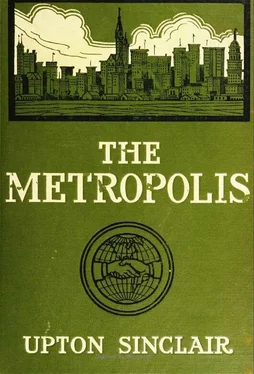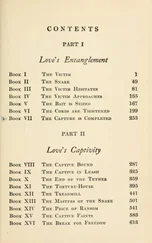Upton Sinclair - The Metropolis
Здесь есть возможность читать онлайн «Upton Sinclair - The Metropolis» весь текст электронной книги совершенно бесплатно (целиком полную версию без сокращений). В некоторых случаях можно слушать аудио, скачать через торрент в формате fb2 и присутствует краткое содержание. Год выпуска: 1908, Издательство: New York, Moffat, Yard & company, Жанр: Старинная литература, на английском языке. Описание произведения, (предисловие) а так же отзывы посетителей доступны на портале библиотеки ЛибКат.
- Название:The Metropolis
- Автор:
- Издательство:New York, Moffat, Yard & company
- Жанр:
- Год:1908
- ISBN:нет данных
- Рейтинг книги:5 / 5. Голосов: 1
-
Избранное:Добавить в избранное
- Отзывы:
-
Ваша оценка:
- 100
- 1
- 2
- 3
- 4
- 5
The Metropolis: краткое содержание, описание и аннотация
Предлагаем к чтению аннотацию, описание, краткое содержание или предисловие (зависит от того, что написал сам автор книги «The Metropolis»). Если вы не нашли необходимую информацию о книге — напишите в комментариях, мы постараемся отыскать её.
The Metropolis — читать онлайн бесплатно полную книгу (весь текст) целиком
Ниже представлен текст книги, разбитый по страницам. Система сохранения места последней прочитанной страницы, позволяет с удобством читать онлайн бесплатно книгу «The Metropolis», без необходимости каждый раз заново искать на чём Вы остановились. Поставьте закладку, и сможете в любой момент перейти на страницу, на которой закончили чтение.
Интервал:
Закладка:
This was the " second generation." Appalling as it was to think of, there was a third growing up, and getting ready to take the stage. And with wealth accumulating faster than ever, who could guess what they might do ? There were still in Society a few men and women who had earned their money, and had some idea of the toil and suffering that it stood for; but when the third generation had taken possession, these would all be dead or forgotten, and there would no longer be any link to connect them with reality!
In the Ught of this thought, one was moved to watch the children of the rich. Some of these had inherited scores of millions of dollars while they were still in the cradle; now and then one of them would be presented with a million-dollar house for a birthday gift. When such a baby was born, the newspapers would give pages to describing its layette, with baby dresses at a hundred dollars each, and lace handkerchiefs at five dollars, and dressing-sets with tiny gold brushes and powder-boxes; one might see a picture of the precious object in a " Moses basket," covered with rare and wonderful Valenciennes lace.
This child would grow up in an atmosphere of luxury and self-indulgence; it would be buUy-
Digitized by Microsoft®
ing the servants at the age of six, and talking scandal and smoking cigarettes at twelve. It would be petted and admired and stared at, and paraded about in state, dressed up like a French doll; it would drink in snobbery and hatefulness with the very air it breathed. One might meet in these great houses little tots not yet in their teens whose talk was all of the cost of things, and of the inferiority of their neighbours. There was nothing in the world too good for them — they had little miniature automobiles to ride about the country in, and blooded Arabian ponies, and doll-houses in real Louis Seize, with jewelled rugs and miniature electric lights. At Mrs. Caroline Smythe's, Montague was introduced to a pale and anaemic-looking youth of thirteen, who dined in solemn state alone when the rest of the family was away, and insisted upon having all the footmen in attendance; and his unfortunate aunt brought a storm about her ears by forbidding the butler to take champagne upstairs into the nursery before lunch.
A little remark stayed in Montague's mind as expressing the attitude of Society toward such matters. Major Venable had chanced to remark jestingly that children were coming to understand so much nowadays that it was necessary for the ladies to be careful. To which Mrs. Vivie Pat-ton answered, with a sudden access of seriousness : " I don't know — do you find that children have any morals.'' Mine haven't."
And then the fascinating Mrs. Vivie went on to tell the truth about her own children. They were natural-born savages, and that was all
Digitized by Microsoft®
there was to it. They did as they pleased, and no one could stop them. The Major repUed that nowadays all the world was doing as it pleased, and no one seemed to be able to stop it; and with that jest the conversation was turned to other matters. But Montague sat in silence, thinking about it — wondering what would happen to the world when it had fallen under the sway of this generation of spoiled children, and had adopted altogether the religion of doing as one pleased.
In the beginning people had simply done as they pleased spontaneously, and without thinking about it; but now, Montague discovered, the custom had spread to such an extent that it was developing a philosophy. There was springing up a new cult, whose devotees were planning to make over the world upon the plan of doing as one pleased. Because its members were wealthy, and able to command the talent of the world, the cult was developing an art, with a highly perfected technique, and a literature which was subtle and exquisite and alluring. Europe had had such a literature for a century, and England for a generation or two. And now America was having it, too !
Montague had an amusing insight into this one day, when Mrs. Vivie invited him to one of her "artistic evenings." Mrs. Vivie was in touch with a special set which went in for intellectual things, and included some amateur Bohemians and men of "genius." "Don't you come if you'll be shocked," she had said to him — "for Strathcona wiU be there."
Montague deemed himself able to stand a
Digitized by Microsoft®
good deal by this time. He went, and found Mrs. Vivie and her Count (Mr. Vivie had apparently not been invited) and also the young poet of Diabolism, whose work was just then the talk of the town. He was a tall, slender youth with a white face and melancholy black eyes, and black locks falling in cascades about his ears; he sat in an Oriental corner, with a manuscript copied in tiny handwriting upon delicately scented ' art paper," and tied with passionate purple ribbons. A young girl clad in white sat by his side and held a candle, while he read from this manuscript his unprinted (because unprintable) verses.
And between the readings the young poet talked. He talked about himself and his work — apparently that was what he had come to talk about. His words flowed like a swift stream, limpid, sparkling, incessant; leaping from place to place — here, there, quick as the play of light upon the water. Montague laboured to follow the speaker's ideas, until he found his mind in a whirl and gave it up. Afterward, when he thought it over, he laughed at himself; for Strath-cona s ideas were not serious things, having relationship to truth — they were epigrams put together to dazzle the hearer, studies in paradox, with as much relation to life as fireworks. He took the sum-total of the moral experience of the human race, and turned it upside down and jumbled it about, and used it as bits of glass in a kaleidoscope. And the hearers would gasp, and whisper, ' Diabolical!"
The motto of this "school" of poets was that there was neither good nor evil, but that all
Digitized by Microsoft®
things were "interesting." After listening to Strathcona for half an hour, one felt like hiding his head, and denying that he had ever thought of having any virtue; m a world where all mings were uncertain, it was presumptuous even to pretend to know what virtue was. One could only be what one was; and did not that mean that one must do as one pleased ?
You could feel a shudder run through the company at his audacity. And the worst of it was that you could not dismiss it with a laugh; for the boy was really a poet — he had fire and passion, the gift of melodious ecstasy. He was only twenty, and in his brief meteor flight he had run the gamut of all experience; he had familiarised himself with all human achievement — past, present, and future. There was nothing anyone could mention that he did not perfectly comprehend: the raptures of the saints, the consecration of the martyrs — yes, he had known them; likewise he had toucned the depths of depravity, he had been lost in the innermost passages of the caverns of hell. And all this had been interesting — in its time; now he was sighing for new worlds of experience — say for an unrequited love, which should drive him to madness.
It was at this point that Montague dropped out of the race, and took to studying from the outside the mechanism of this young poet's conversation. Strathcona flouted the idea of a moral sense; but in reality he was quite dependent upon it — his recipe for making epigrams was to take what other people's moral sense made
Digitized by Microsoft®
them respect, and identify it with something which their moral sense made them abhor. ■ Thus, for instance, the tale which he told about one of the members of his set, who was a relative of a bishop. The great man had occasion to rebuke him for his profligate ways, declaring in the course of his lecture that he was living off the reputation of his father; to which the boy made the crushing rejoinder: "It may be bad to live off the reputation of one's father, but it's better than living off the reputation of God."—This was very subtle, and it was necessary to ponder it. God was dead; and the worthy bishop did not know it! But let him take a new God, who had no reputation, and go out into the world and make a living out of him !
Читать дальшеИнтервал:
Закладка:
Похожие книги на «The Metropolis»
Представляем Вашему вниманию похожие книги на «The Metropolis» списком для выбора. Мы отобрали схожую по названию и смыслу литературу в надежде предоставить читателям больше вариантов отыскать новые, интересные, ещё непрочитанные произведения.
Обсуждение, отзывы о книге «The Metropolis» и просто собственные мнения читателей. Оставьте ваши комментарии, напишите, что Вы думаете о произведении, его смысле или главных героях. Укажите что конкретно понравилось, а что нет, и почему Вы так считаете.












